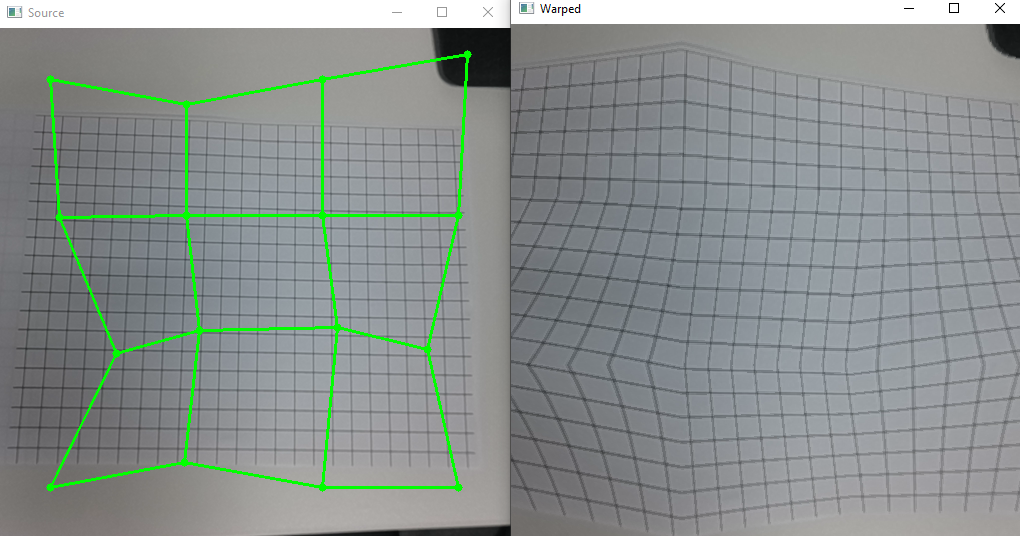Interactive Warp Mesh¶
This example shows usage of Warp node to warp the input image frame. It let’s you interactively change the mesh points to warp the image. After changing the points,
user has to press r to restart the pipeline and apply the changes.
User-defined arguments:
--mesh_dims- Mesh dimensions (default:4x4).--resolution- Resolution of the input image (default:512x512). Width must be divisible by 16.--random- To generate random mesh points (disabled by default).
Originally developed by geaxgx.
Setup¶
Please run the install script to download all required dependencies. Please note that this script must be ran from git context, so you have to download the depthai-python repository first and then run the script
git clone https://github.com/luxonis/depthai-python.git
cd depthai-python/examples
python3 install_requirements.py
For additional information, please follow installation guide
Source code¶
Also available on GitHub
1 2 3 4 5 6 7 8 9 10 11 12 13 14 15 16 17 18 19 20 21 22 23 24 25 26 27 28 29 30 31 32 33 34 35 36 37 38 39 40 41 42 43 44 45 46 47 48 49 50 51 52 53 54 55 56 57 58 59 60 61 62 63 64 65 66 67 68 69 70 71 72 73 74 75 76 77 78 79 80 81 82 83 84 85 86 87 88 89 90 91 92 93 94 95 96 97 98 99 100 101 102 103 104 105 106 107 108 109 110 111 112 113 114 115 116 117 118 119 120 121 122 123 124 125 126 127 128 129 130 131 132 133 134 135 136 137 138 139 140 141 142 143 144 145 146 147 148 149 150 151 152 153 | #!/usr/bin/env python3
import cv2
import depthai as dai
import numpy as np
import argparse
import re
import sys
from random import randint
parser = argparse.ArgumentParser()
parser.add_argument("-m", "--mesh_dims", type=str, default="4x4", help="mesh dimensions widthxheight (default=%(default)s)")
parser.add_argument("-r", "--resolution", type=str, default="512x512", help="preview resolution (default=%(default)s)")
parser.add_argument("-rnd", "--random", action="store_true", help="Generate random initial mesh")
args = parser.parse_args()
# mesh dimensions
match = re.search(r'.*?(\d+)x(\d+).*', args.mesh_dims)
if not match:
raise Exception(f"Mesh dimensions format incorrect '{args.resolution}'!")
mesh_w = int(match.group(1))
mesh_h = int(match.group(2))
# Preview resolution
match = re.search(r'.*?(\d+)x(\d+).*', args.resolution)
if not match:
raise Exception(f"Resolution format incorrect '{args.resolution}'!")
preview_w = int(match.group(1))
preview_h = int(match.group(2))
if preview_w % 16 != 0:
raise Exception(f"Preview width must be a multiple of 16!")
# Create an initial mesh (optionally random) of dimension mesh_w x mesh_h
first_point_x = int(preview_w / 10)
between_points_x = int(4 * preview_w / (5 * (mesh_w - 1)))
first_point_y = int(preview_h / 10)
between_points_y = int(4 * preview_h / (5 * (mesh_h - 1)))
if args.random:
max_rnd_x = int(between_points_x / 4)
max_rnd_y = int(between_points_y / 4)
mesh = []
for i in range(mesh_h):
for j in range(mesh_w):
x = first_point_x + j * between_points_x
y = first_point_y + i * between_points_y
if args.random:
rnd_x = randint(-max_rnd_x, max_rnd_x)
if x + rnd_x > 0 and x + rnd_x < preview_w:
x += rnd_x
rnd_y = randint(-max_rnd_y, max_rnd_y)
if y + rnd_y > 0 and y + rnd_y < preview_h:
y += rnd_y
mesh.append((x, y))
def create_pipeline(mesh):
print(mesh)
# Create pipeline
pipeline = dai.Pipeline()
camRgb = pipeline.create(dai.node.ColorCamera)
camRgb.setPreviewSize(preview_w, preview_h)
camRgb.setInterleaved(False)
width = camRgb.getPreviewWidth()
height = camRgb.getPreviewHeight()
# Output source
xout_source = pipeline.create(dai.node.XLinkOut)
xout_source.setStreamName('source')
camRgb.preview.link(xout_source.input)
# Warp source frame
warp = pipeline.create(dai.node.Warp)
warp.setWarpMesh(mesh, mesh_w, mesh_h)
warp.setOutputSize(width, height)
warp.setMaxOutputFrameSize(width * height * 3)
camRgb.preview.link(warp.inputImage)
warp.setHwIds([1])
warp.setInterpolation(dai.Interpolation.NEAREST_NEIGHBOR)
# Output warped
xout_warped = pipeline.create(dai.node.XLinkOut)
xout_warped.setStreamName('warped')
warp.out.link(xout_warped.input)
return pipeline
point_selected = None
def mouse_callback(event, x, y, flags, param):
global mesh, point_selected, mesh_changed
if event == cv2.EVENT_LBUTTONDOWN:
if point_selected is None:
# Which point is selected ?
min_dist = 100
for i in range(len(mesh)):
dist = np.linalg.norm((x - mesh[i][0], y - mesh[i][1]))
if dist < 20 and dist < min_dist:
min_dist = dist
point_selected = i
if point_selected is not None:
mesh[point_selected] = (x, y)
mesh_changed = True
elif event == cv2.EVENT_LBUTTONUP:
point_selected = None
elif event == cv2.EVENT_MOUSEMOVE:
if point_selected is not None:
mesh[point_selected] = (x, y)
mesh_changed = True
cv2.namedWindow("Source")
cv2.setMouseCallback("Source", mouse_callback)
running = True
print("Use your mouse to modify the mesh by clicking/moving points of the mesh in the Source window")
print("Then press 'r' key to restart the device/pipeline")
while running:
pipeline = create_pipeline(mesh)
# Connect to device and start pipeline
with dai.Device(pipeline) as device:
print("Starting device")
# Output queue will be used to get the rgb frames from the output defined above
q_source = device.getOutputQueue(name="source", maxSize=4, blocking=False)
q_warped = device.getOutputQueue(name="warped", maxSize=4, blocking=False)
restart_device = False
mesh_changed = False
while not restart_device:
in0 = q_source.get()
if in0 is not None:
source = in0.getCvFrame()
color = (0, 0,255) if mesh_changed else (0,255,0)
for i in range(len(mesh)):
cv2.circle(source, (mesh[i][0], mesh[i][1]), 4, color, -1)
if i % mesh_w != mesh_w -1:
cv2.line(source, (mesh[i][0], mesh[i][1]), (mesh[i+1][0], mesh[i+1][1]), color, 2)
if i + mesh_w < len(mesh):
cv2.line(source, (mesh[i][0], mesh[i][1]), (mesh[i+mesh_w][0], mesh[i+mesh_w][1]), color, 2)
cv2.imshow("Source", source)
in1 = q_warped.get()
if in1 is not None:
cv2.imshow("Warped", in1.getCvFrame())
key = cv2.waitKey(1)
if key == ord('r'): # Restart the device if mesh has changed
if mesh_changed:
print("Restart requested...")
mesh_changed = False
restart_device = True
elif key == 27 or key == ord('q'): # Exit
running = False
break
|
WIP
